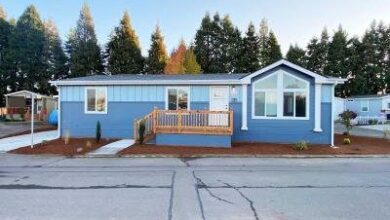Mobile Homes for Sale in Connecticut: A Comprehensive Guide
Mobile Homes for Sale in Connecticut – Are you in search of a mobile home in Connecticut? Look no further! In this comprehensive guide, we will provide you with all the information you need to know about mobile homes for sale in Connecticut. From the different types of mobile homes available to the best neighborhoods to consider, we’ve got you covered. So, let’s dive in and explore the world of mobile homes in the beautiful state of Connecticut.
Connecticut offers a wide range of options when it comes to mobile homes for sale. Whether you are a first-time buyer or looking to downsize, there is a mobile home that will suit your needs. Mobile homes are an affordable housing option that provides flexibility and the opportunity to own your own home without breaking the bank.
Types of Mobile Homes in Connecticut
When searching for a mobile home in Connecticut, it’s essential to understand the different types available. One popular option is the single-wide mobile home. These homes are typically narrower and more compact, making them an ideal choice for individuals or small families. Single-wide mobile homes often come with two or three bedrooms, a kitchen, living area, and one or two bathrooms.
On the other hand, if you need more space, a double-wide mobile home may be a better fit for you. Double-wide homes are wider than single-wide homes and offer more square footage. They often feature three or four bedrooms, a spacious kitchen, multiple bathrooms, and a larger living area. These homes provide ample space for families or those who desire more room to spread out.
Affordability and Customization
One of the advantages of mobile homes is their affordability compared to traditional houses. Mobile homes typically have a lower price tag, making homeownership more accessible for many individuals and families. Additionally, mobile homes offer customization options, allowing homeowners to personalize their living spaces. From choosing flooring materials to selecting appliances, you can make your mobile home truly your own.
Manufactured Homes
In addition to single-wide and double-wide mobile homes, you may also come across manufactured homes in Connecticut. Manufactured homes are built in a factory and then transported to their final location. These homes must meet specific construction standards set by the Department of Housing and Urban Development (HUD). Manufactured homes are available in various sizes and designs, offering a wide range of options for potential buyers.
Financing Options for Mobile Homes
Buying a mobile home is a significant investment, and understanding the financing options available is crucial. Fortunately, there are several ways to finance your mobile home purchase in Connecticut. One option is to obtain a traditional mortgage from a bank or financial institution. However, it’s important to note that not all lenders offer mortgage loans for mobile homes, so it’s essential to research and find a lender who specializes in mobile home financing.
Government Programs
Another financing option to consider is government programs specifically designed for mobile home buyers. The Federal Housing Administration (FHA) offers loans for qualifying mobile homes. These loans often have more flexible credit requirements and lower down payment options, making homeownership more attainable for individuals with limited financial resources.
Connecticut also has programs available to assist first-time homebuyers, including those purchasing mobile homes. The Connecticut Housing Finance Authority (CHFA) provides various resources and assistance programs to help individuals and families achieve their dream of homeownership. These programs can provide down payment assistance, low-interest loans, and other incentives to make buying a mobile home more affordable.
Choosing the Right Location
Location is a crucial factor when buying a mobile home in Connecticut. You’ll want to consider factors such as proximity to amenities, schools, employment opportunities, and transportation options. Here are some key points to consider when choosing the right location for your mobile home:
Proximity to Amenities
Consider the proximity of your potential mobile home to essential amenities such as grocery stores, healthcare facilities, and recreational areas. Having these amenities nearby will enhance your convenience and quality of life.
School Districts
If you have children or plan to start a family, it’s important to research the school districts in the areas you are considering. Look for neighborhoods with reputable schools that provide a quality education for your children.
Transportation Options
Access to transportation is vital, whether you commute to work or rely on public transportation. Consider the availability of highways, public transit systems, and proximity to major cities when choosing the location of your mobile home.
Neighborhood Safety
Ensure that the neighborhood you choose is safe and secure. Research crime rates, speak with local residents, and visit the area at different times of the day to get a sense of the overall safety and security.
Mobile Home Parks in Connecticut
If you prefer the sense of community and amenities that mobile home parks offer, Connecticut has several options to choose from. Mobile home parks provide a convenient and affordable housing solution, often offering shared amenities such as swimming pools, community centers, and playgrounds. Here are some popular mobile home parks in Connecticut:
Park Name 1
Description of the first mobile home park, highlighting its location, amenities, and any unique features that set it apart from others.
Park Name 2
Description of the second mobile home park, emphasizing its advantages, such as proximity to schools, shopping centers, and recreational facilities.
Park Name 3
Description of the third mobile home park, focusing on its amenities, such as a fitness center, walking trails, or community events.
Mobile Home Insurance
Protecting your investment is essential, and having the right insurance coverage is crucial when it comes to mobile homes. Mobile home insurance provides coverage for your home and personal belongings in the event of damage, theft, or other unforeseen circumstances. Here are some key points to consider when choosing mobile home insurance:
Policy Coverage
Review the coverage options provided by different insurance companies. Ensure that the policy covers the replacement cost of your mobile home, as well as personal property, liability, and additional living expenses in case of displacement.
Deductibles and Premiums
Compare the deductibles and premiums offered by different insurance providers. Consider your budget and choose a policy with reasonable deductibles and premiums that provide adequate coverage.
Additional Coverage Options
Some insurance companies offer additional coverage options for specific risks such as floods, earthquakes, or hurricanes. Evaluate your geographical location and assess whether additional coverage is necessary for your mobile home.
Mobile Home Inspections
Before purchasing a mobile home, it’s crucial to have a thorough inspection done to ensure there are no hidden issues. Inspections can identify potential problems and give you a better understanding of the home’s condition. Here are some areas that should be inspected:
Structural Integrity
An inspector will examine the overall structure of the mobile home, including the foundation, walls, roof, and flooring. They will check for any signs of damage, such as cracks, leaks, or rot.
Plumbing and Electrical Systems
The inspector will assess the plumbing system, checking for leaks, water pressure issues, and the functionality of fixtures. They will also examine the electrical system, ensuring that it meets safety standards and is free from any hazards.
Heating and Cooling Systems
If the mobile home has heating and cooling systems, the inspector will evaluate their performance and efficiency. They will assess the condition of the HVAC equipment, ductwork, and thermostat.
Appliances and Fixtures
Inspectors will test all appliances and fixtures included with the mobile home to ensure they are in working order. This includes checking the stove, refrigerator, washer, dryer, and any other built-in fixtures.
Upgrades and Renovations
If you’re looking to personalize your mobile home or make upgrades, there are various options available to enhance your living space. From simple DIY projects to more extensive renovations, here are some ideas to consider:
Interior Remodeling
Upgrade your mobile home’s interior by repainting walls, installing new flooring, or updating fixtures and appliances. Consider modernizing the kitchen with new countertops, cabinets, and backsplash to give it a fresh look.
Exterior Enhancements
Add curb appeal to your mobile home by improving the exterior. This can include landscaping, adding a porch or deck, or installing outdoor lighting. Enhancing the exterior aesthetics not only improves the overall look of your home but also increases its value.
Energy Efficiency Upgrades
Make your mobile home more energy-efficient by installing insulation, replacing windows with energy-efficient models, and upgrading to energy-saving appliances. These upgrades can reduce energy consumption and lower utility bills.
Maintenance and Care
Maintaining your mobile home is vital to ensure its longevity and value. Regular maintenance and care can prevent costly repairs and keep your home in excellent condition. Here are some maintenance tips:
Roof Maintenance
Inspect the roof annually for any signs of damage, such as loose or missing shingles, leaks, or sagging areas. Replace any damaged or worn-out roofing materials promptly to prevent water damage.
Regular Cleaning
Regularly clean both the interior and exterior of your mobile home to keep it looking its best. This includes dusting, vacuuming, mopping floors, and washing windows. Clean the exterior siding or cladding to remove dirt, grime, and debris.
Inspect and Clean Gutters
Check and clean the gutters regularly to ensure they are free from leaves, twigs, and other debris. Clogged gutters can lead to water overflow, which can cause damage to the roof, walls, and foundation of your mobile home.
HVAC System Maintenance
Keep your heating and cooling system in optimal condition by scheduling regular maintenance. This includes changing filters, cleaning vents, and having professional inspections and servicing done as recommended by the manufacturer.
Buying a Used Mobile Home
Buying a used mobile home can be a great option for those on a budget or looking for a more affordable housing solution. Here are some points to consider when purchasing a used mobile home:
Thorough Inspection
Before finalizing the purchase, have a professional inspector thoroughly examine the used mobile home. They will assess its condition, including the structural integrity, plumbing, electrical systems, and appliances. This will help identify any potential issues and ensure you are making an informed decision.
Research the Seller
Do your due diligence and research the seller of the used mobile home. Check their reputation and reviews, and ask for references from previous buyers. Verify that the seller has the necessary documentation and legal rights to sell the mobile home.
Consider the Age and Maintenance
Take into account the age of the used mobile home and the level of maintenance it has received. Older homes may require more frequent repairs and updates, so factor in these potential costs when determining your budget.
Negotiate the Price
When buying a used mobile home, don’t be afraid to negotiate the price. Consider factors such as the condition of the home, any necessary repairs or updates, and comparable prices of similar homes in the area. Negotiating can help you secure a fair deal.
Finalizing the Purchase
Once you’ve found the perfect mobile home, it’s time to finalize the purchase. Here are the necessary steps and paperwork involved in buying a mobile home in Connecticut:
Offer and Acceptance
Submit an offer to the seller outlining the price, terms, and conditions of the purchase. If the seller accepts your offer, you can proceed to the next steps.
Home Inspection Contingency
Include a home inspection contingency clause in the purchase agreement, allowing you to have the mobile home inspected by a professional. If any major issues are discovered during the inspection, you can negotiate repairs or reconsider your offer.
Loan Approval and Closing
If you require financing, secure loan approval from your chosen lender. Once approved, prepare for the closing process. This involves signing the necessary legal documents, transferring funds, and officially completing the purchase of the mobile home.
Title Transfer and Insurance
Ensure that the mobile home’s title is transferred to your name through the appropriate channels. Additionally, obtain mobile home insurance coverage to protect your investment.
In conclusion, buying a mobile home in Connecticut can be a rewarding and affordable housing option. The state offers various types of mobile homes, financing options, and desirable locations to choose from. Whether you opt for a single-wide or double-wide mobile home, it’s essential to consider factors such as location, amenities, and financing when making your decision.
Researching mobile home parks in Connecticut can provide a sense of community and shared amenities. Additionally, obtaining the right insurance coverage and conducting thorough inspections are crucial for protecting your investment and ensuring the mobile home’s condition. With proper maintenance and care, you can enjoy your mobile home for years to come.
If you’re considering a used mobile home, take the time to thoroughly inspect the home and research the seller. Negotiate the price based on the home’s condition and age, and ensure all necessary paperwork is in order before closing the deal.
By following the comprehensive information provided in this guide, you are now equipped with the knowledge to make an informed decision when purchasing a mobile home in Connecticut. So, start your search today and make your dream of owning a home in the beautiful state of Connecticut a reality.









